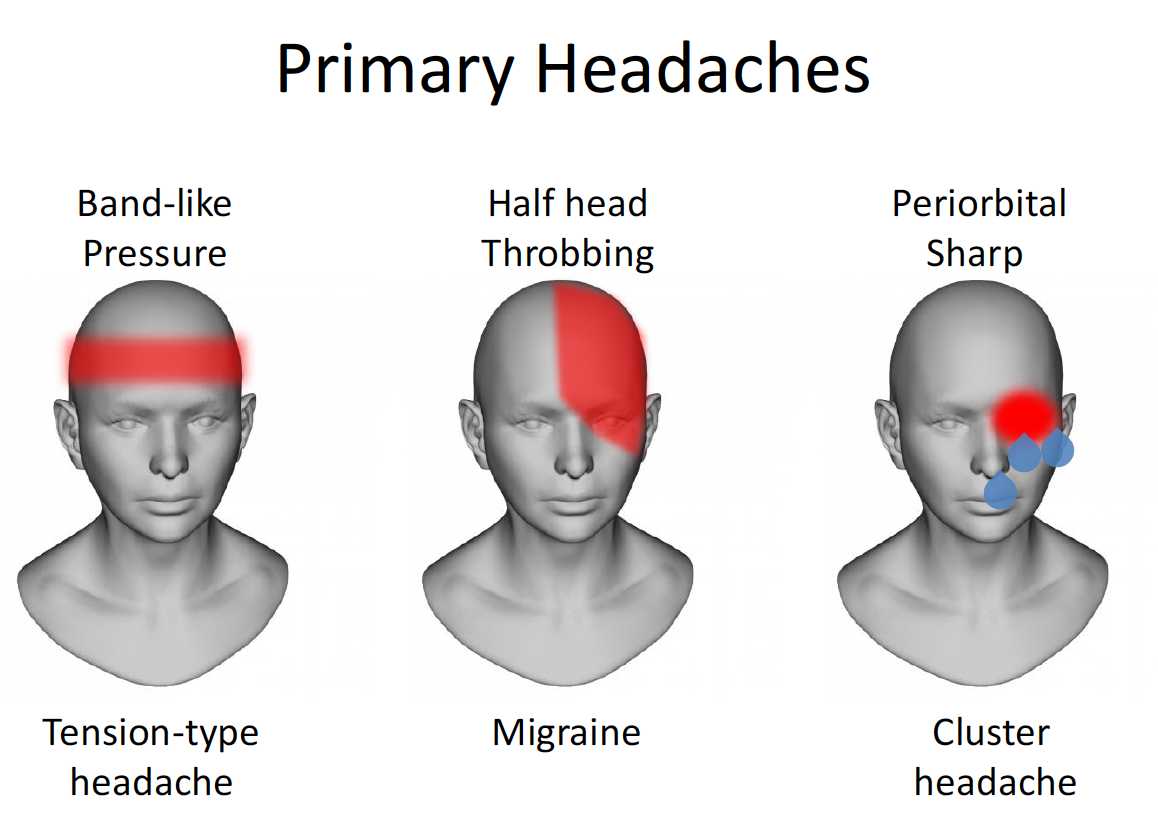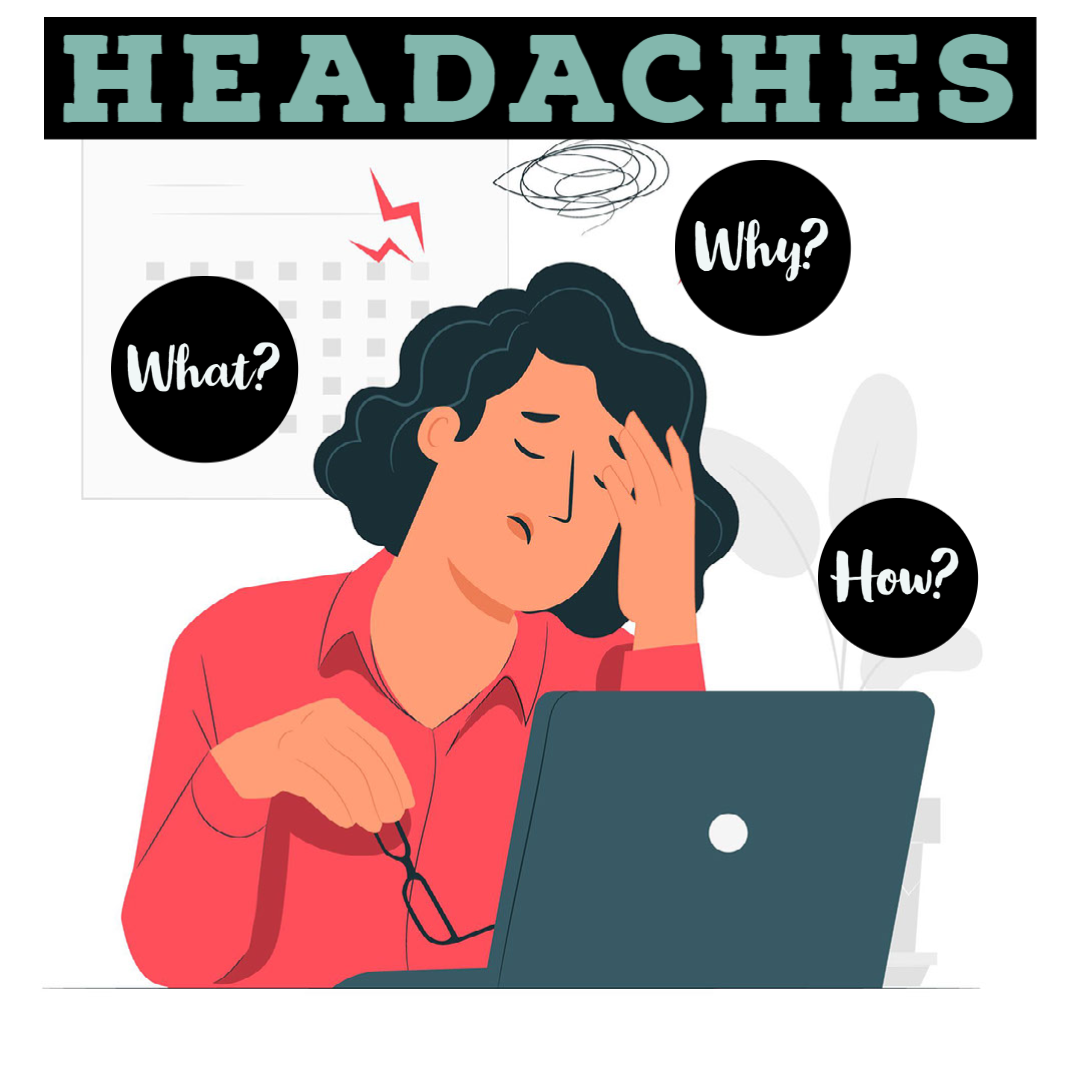
What is a headache?
A headache is a painful sensation in any part of the head. It can be a sign of stress or emotional distress. It can also result from a medical disorder such as a migraine, high blood pressure, anxiety or depression. Headaches can sometimes be difficult to describe but some common symptoms are throbbing, squeezing, constant unrelenting or intermittent. The location may be in on one part of the face or skull or may be generalized involving the whole head.
The head is the most common site of pain in the body. Headaches may arise spontaneously or may be associated with activity or exercise. It may have an acute onset or it may be chronic in nature with or without episodes of increasing severity. It is a pain arising from the head or upper neck of the body. The pain originates from the tissue and structures that surround the skull or the brain because the brain itself has no nerves which give rise to the sensation of pain (pain fibers). The thin layer of tissue (periosteum) that surrounds the bones, muscles that encase the skull, sinuses, eyes and ears, as well as thin tissues that cover the surface of the brain and spinal cord (meninges), arteries, veins, and nerves, all can become inflamed or irritated and cause headaches.
Classification of Headaches:
Head pain can be classified as being one of the three types:
- Primary headache
- Secondary headache
- Cranial neuralgias, facial pain and other headaches.
Primary Headaches:

Primary headaches include migraine, tension and cluster headaches.
Tension Headaches:
They are the most common types of primary headaches. They occur more commonly among women than men. According to WHO, 1 in 20 people suffer with a daily tension headache. While tension headaches are the most frequently occurring type of headache, their cause is not known. The most likely cause is contraction of the muscles that cover the skull. When the muscles covering the skull are stressed, they may become inflamed, go into spasm and cause pain. Common sites include the base of the skull where the trapezius muscles of the neck insert, the temples where the muscles that move the jaw are located and the forehead.
Some believe that tension headaches occur because of physical stress on the muscles of the head. For example, these stressors can cause the muscles surrounding the skull to clench the teeth and go into spasm. Physical stressors include difficult and prolonged manual labor or sitting at a desk or computer concentrating for long periods. Emotional stress might also cause tension headaches by causing the muscles surrounding the skull to contract. Tension headaches are painful and can make daily activities more difficult to accomplish.
The following treatments assist in reducing such headaches:
- Aspirin
- Ibuprofen
- Acetaminophen
- Naproxen
Migraine Headaches:
The second most common type of primary headaches. Migraine headaches affect children as well as adults. Before puberty, boys and girls are affected equally by migraine headaches, but after puberty, more women than men are affected.
Cluster Headaches:
Are a rare type of primary headache. It more commonly affects men in their late 20s, though women and children can also suffer from them. Cluster headaches are so named because they tend to occur daily for periods of a week or more followed by long periods of time, months to years with no headaches. They occur at the same time of the day, often waking the patient in the middle of the night. The cause of cluster headaches is uncertain but may be due to a sudden release of the chemicals histamine and serotonin in the brain. The hypothalamus, an area located at the base of the brain, is responsible for the body’s biological clock and may be the source of this type of headache.
Cluster headaches also tend to run in families and this suggests that there may be a role for genetics. It may be triggered by changes in sleep patterns and may be triggered by medications. Each episode of pain lasts from 30 to 90 minutes. The pain typically is excruciating and located around or behind the eye.
Initial treatments may include one or more of the following:
- Inhalation of high concentrations of oxygen.
- Injection of triptan medications like Sumatriptan, Zolmitriptan and Rizatriptan.
- Spraying or dripping Lidocaine in the nostril.
- Dihydroergotamine, a medication that causes blood vessels to constrict
- Caffeine.
Primary headaches can affect the quality of life. Some people have occasional headaches that resolve quickly while others are debilitating. While these headaches are not life threatening, they may be associated with symptoms that can mimic strokes. Many patients equate severe headaches with migraine, but the amount of pain does not determine the diagnosis of a migraine.
Secondary Headaches:

Secondary headaches are those that are due to an underlying structural or infectious problem in the head or neck. This is a very broad group of medical conditions ranging from dental pain from infected teeth or pain from an infected sinus, to life threatening conditions like bleeding in the brain or infections like encephalitis or meningitis. Traumatic headaches fall into the category including post-concussion headaches. This group of headaches also include those headaches associated with substance abuse and excess use of medications used to treat headaches. “Hangover” headaches also fall into this category. People who drink too much alcohol may waken with a well established headache due to the effects of alcohol and dehydration.
Cranial Neuralgias, Facial Pain and other Headaches:
Neuralgias means nerve pain (neur=nerve + algia=pain). Cranial neuralgias describes inflammation of one of the 12 cranial nerves coming from the brain that control the muscles and sensory signals to and from the neck. The most commonly recognised example is trigeminal neuralgia, which affects cranial nerve V (the trigeminal nerve), the sensory nerve that supplies the face and can cause intense facial pain when irritated or inflamed.
Seek Medical Care If :
- Your headaches are different from your usual headaches.
- It starts suddenly or is aggravated by exertion, coughing, bending over over sexual activity.
- Associated with persistent nausea and vomiting.
- It is associated with fever or a stiff neck.
- Associated with seizures
- Recent head trauma or fall.
- Changes in vision, speech or behavior.
- Disabling or interfering with work and quality of life.
Here Are Some Home Remedies:
- Maximize rest and stay well hydrated.
- Recognize and minimize stressful situations.
- If you have a runny nose or a cold, humidifying air may be helpful in allowing sinuses to drain.
- Rub or massage the temples or the muscles at the back of the neck.
- Over the counter pain medication.
Wrapping Up:
People experience different types of headaches. If it bothers you daily, seek medical attention otherwise there are many home remedies for it.
Read about Depression here.


